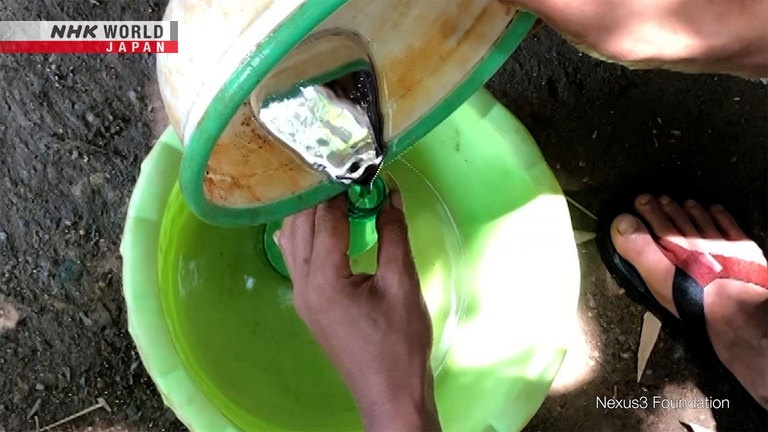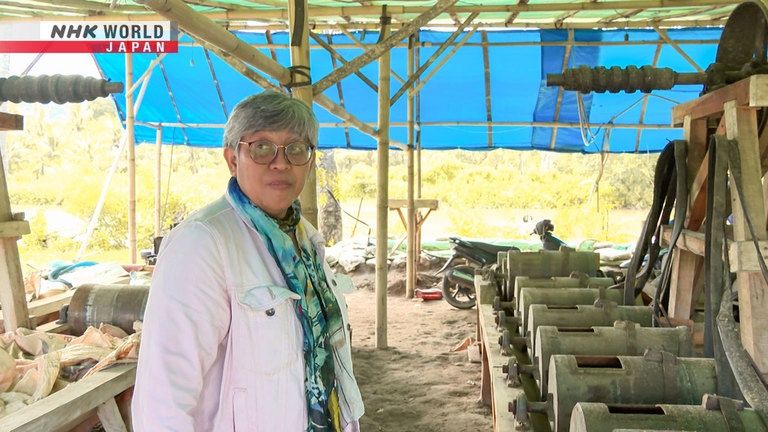For Victims of the Gold Rush: Yuyun Ismawati / Co-founder, Nexus3 Foundation
Indonesian environmental activist Yuyun Ismawati, co-founder of the Nexus3 Foundation NGO, has been tackling the mercury poisoning issues caused by illegal gold mining practices.


Transcript
Direct Talk
Dazzling gold.
In recent years, its price
has been recording historic highs.
In Indonesia,
one of the world's biggest gold producers,
this has accelerated the illegal practice of
Artisanal and Small-scale Gold Mining,
or "ASGM."
The "gold-rush" attracts many people
to try their luck in remote areas.
However, mercury, a highly toxic substance,
is widely being used to
extract the gold easily and cheaply.
Concerns have mounted
regarding the risks to people's health.
Indonesian environmental activist
Yuyun Ismawati
has been raising awareness
of this alarming issue
by conducting fact-finding surveys.
We measured the mercury level.
It's more than 10 times the WHO standard.
People shouldn't live here. You should evacuate.
In ASGM hotspots, Yuyun has observed
increasing numbers of children
with chronical physical disabilities
and neurological diseases.
Mercury impacting their lives
and treated them
injustice.
I just want to help them as much as I can.
What is happening there
amid the global gold boom?
We will hear from the woman
tackling this harsh reality.
For Victims of the Gold Rush
It's estimated that
across the Indonesian archipelago
there are more than 1,000 ASGM hotspots
operating without permission.
Pieces of mined ore are
first crushed into small pieces
and then put into machines
called "ball-mills."
In this process, workers touch mercury
with their bare hands.
It's added to the crushed ore
and then mixed for hours.
The mercury gathers small gold particles
to make "amalgam."
But when this amalgam is burned
during the smelting process,
a massive amount of evaporated mercury
is released into the air.
Why miners use mercury
to process gold? Because it's easy.
You can do it within 2 to 4, or 5 hours.
Mercury is acting like a magnet
to get all the gold together.
When they start mixing it,
touching them with their hands.
They got mercury from their skin
into the body and blood.
When they burned the amalgam to get gold,
they inhaling also mercury.
All
plants, rice fields,
fish in the rivers...
they're also contaminated by mercury.
So, the whole chain of activities
is really affecting the environment
and people who lives around it.
For the past 15 years,
Yuyun has been carrying out field research
on mercury issues in ASGM areas.
Today, based on information from
local NGOs and regional authorities,
her team will survey a remote village
located several hours from the nearest town.
This is centralized in one area.
"Ball-mill" machines are working
right between the houses.
A small mercury bottle is found.
Yuyun's team uses a mercury vapor analyser
to check the mercury
contamination level in the air.
In several places
it shows a high toxic level.
Samples of local soil and food,
as well as villager's hair,
are collected for their
mercury accumulation level
to be checked at an overseas institution.
Yuyun also hears directly from villagers
how they use mercury and
whether they have any health issues.
I heard mercury is not good for health.
But everybody is using it.
I try to wash my hands after use.
At the beginning, miners, reluctantly
admitted that they have health problems.
Many families of miners or families
who live in ASGM hotspots,
naturally they will not open to strangers.
To be able to know them more, you have to
build relationships and gain their trust.
Because
miners would think that
we could be against their practice
and shut down the mining activities.
Miners do not consider mercury as
harmful substances.
They said,
we've been using it for a couple of years,
I have no problem at all.
I can drink it in front of you,
so they demonstrated it.
If you live in that area for a week,
you will taste metallic taste in your mouth,
because you inhale the vapor of mercury.
And then also you will feel dizzy.
Miners need money for today, so
they ignore the fact that
they could be sick as well.
ASGM areas face a severe health impact,
especially on children.
In this area, the authority says
more than 10 babies with birth defects
have died in the last 10 years.
This baby was born in 2018 with only one eye.
The parents were working at ASGM sites.
Yuyun's NGO has helped many children
suffering from the effects
of mercury poisoning
such as physical disabilities and dyslexia,
to get proper medical care.
Rido, who lives on Lombok island,
is one of them.
He was born without an anus
and suffered urinary organ problems.
After more than 10 operations,
he can now go to the local elementary school.
He hasn't been cured completely yet.
But he's grown a lot compared to the past,
when he was so thin because he couldn't eat well.
Saying this is just the tip of the iceberg,
Yuyun does her best to support
these children with all her strength.
They live there with the parents...
the children do not have
any other options than
playing around in the
mercury polluted environment.
I've seen different
different kind of illnesses
in the communities from
stroke,
people paralyzed, they couldn't walk
to birth defects.
They couldn't walk,
they couldn't talk,
and they got cerebral palsy at one point...
and then also children born with
birth defects without fingers
and without anus or with cataracts and so on.
My motivation is to see
these children growing.
Some children died
because we cannot help them,
because there is no
health system to help them.
We felt sorry when we heard from the family
that the children passed away.
Instead of waiting for
a government to respond,
we started doing our
own activities and initiatives
because these children cannot wait.
Yuyun was born in 1964 in the city of Bandung
in West Java province.
Her father was in the military,
so she lived in various parts
of the archipelago
feeling the different dynamics of nature.
With her high motivation
regarding environmental issues,
Yuyun studied environmental
engineering at university.
Then she started working as an
environmental impact assessor for companies.
In order to contribute more extensively
to environmental issues,
she quit her job in the mid-1990s
and joined an NGO.
Some years later, she established her own NGO
with colleagues on Bali Island
to deal with waste management
and water sanitation problems.
In 2009, in recognition of her years
of grassroot projects,
she was awarded the
"Goldman Environmental Prize,"
also known as the "Green Nobel" prize.
During my involvement with girl scout,
I explored so many places:
river areas, climb the hills,
go to the mountain
and then walk along the coastal areas.
That's fascinating for me.
But when I stepped outside
of the national park,
the situation is really different
because in that area
there is a logging companies operated.
Then in some places, the river was polluted.
And then I thought,
"How can I improve this?"
When I moved to the NGO sector,
I feel more freedom
to work on the field that I'd like to do.
I was so happy that I had good knowledge.
I know how to modify things, how to design
a solid waste management system,
a waste-water system.
And then eventually I learned
how to build a non-profit organisation.
Regarding the issue that Yuyun
had been working on for more than 10 years,
the Indonesian government issued
a presidential instruction in 2017
to ban the use of mercury in ASGM areas.
Mercury use has caused severe contamination.
However, the regulations
aren't working well on the ground
and there are still serious challenges.
Yuyun is concerned about the
acceleration of illegal mercury production
since the government's importation ban.
Illegal mercury is still widely available
via social media and e-commerce sites
and it only costs about
100 US dollars per kilogram.
Look at this, what they said.
Here's a coffee, boss.
They use code-name for mercury
replaced it as "coffee."
Mercury, cash on delivery...
this is the WhatsApp number.
People can sell it freely
and they even put the phone number.
How come the police cannot stop them?
By prohibiting the importation of mercury,
miners and gold buyers
or financiers start looking for
a new source of mercury,
which was, unfortunately,
available in Indonesia.
There is no regulation
to prohibit the cinnabar mining.
There is no regulation
to prohibit the smelter
or the processing of cinnabar
to become mercury.
We still need to have more pressure
to stop the trade of mercury, because
that's the most important issue in this case.
Lombok Island
The mercury issue is too huge to fight alone,
so Yuyun is now trying to
establish a wider network
to work with in the areas with lots of ASGMs.
Yuyun informs university students
about the mercury pollution
occurring in their local areas and asks for
their collaboration in tackling the issue.
If you're interested and want to collaborate,
you're welcome to act. Let's visit the locations...
and discover how severe the impact
is on the community.
As medical students, we need to increase
our empathy, as Yuyun said to us.
We must go to the field so that we can
help prevent mercury contamination.
Yuyun also collected donations from companies
for a state-of-the-art mercury analyser
to be sent to this university.
It will make it possible to analyse
mercury levels quickly
in soil, water, and blood samples.
It's important to
have the local experts here.
And when the capacity
already built and increased,
they will have more supporting system
that enables people and them
to help their own people.
We need to strengthen the capacity of
the local actors, researchers, policy makers
to cope with this situation
that will last long.
The problem will still be there,
if we do not act now.
Yuyun has long been fighting alone to
tackle the mercury issue with this motto.
"When we strive to become better than we are,
everything around us becomes better too."
The good changes that we created will
attract more people to do the same thing.
Doesn't matter whether you have
money or not, you can always help others.
That kind of spirit that we try to introduce.